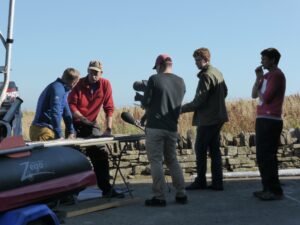
A new television series, ‘My year with the tribe’, has already received mixed reviews for twenty-first century voyeurism and the staunch way in which our hero, Will Millard, pushes on with his plans to film an ‘untouched’ tribe, despite early indications that the activities of previous television teams and wealthy tourists now direct the authentic life-styles of his targets. The series, which airs on a Sunday evening on BBC Two, is set in the Indonesian province of Papua and concerns the Korowai people.
My own disappointment came early on when Millard commented that he saw the Korowai as: ‘our link to our own pasts, you know, back when we were all living in the forest’. I thought that we had abandoned that type of simplistic Darwinian viewpoint years ago. It is wrong for all sorts of reasons. The Korowai are not a link to our past:
- They live in the twenty-first century;
- They live in Indonesia.
Never mind the fact that you are talking deep prehistory if you want to go back to a time when we lived in any sort of rainforest resembling the homelands of Papua. To talk as if the Korowai are some sort of throwback, ignores thousands of years of development. Whatever their lifestyles, communities today have all benefitted from millennia of experience. Geographical and cultural dissonance do not equate to time travel. Evolution, as set out in the nineteenth century, was a significant theoretical advance in the way we thought about the world, but it has been developed and modified since Darwin first proposed it. It is no longer regarded as a straightforward path from ‘simple’ to ‘complex’, ‘primitive’ to ‘civilised’. Life is more complicated, twenty-first century life, infinitely more so. The Korowai occupy an environment that is worlds away from that of western Europe, at any time. Their lifestyle has evolved to fill it. To suggest that they represent some sort of evolutionary standstill is to belittle them.
Nevertheless, I think I am going to like this series, though for all the wrong reasons. In many ways I am amazed that the BBC still condone such apparently naive, poorly prepared filmaking. There is a horrible fascination to watching it. In an ironic twist to Millard’s colonial introduction, we quickly find that the Korowai have, indeed, adapted perfectly to fit the twenty-first century. So much so, in fact, that they enter into convincing discussions of the treehouse dwellings and lack of modern clothing that he wishes to film. Plans are made, the TV crew are excited and set off through the rainforest with their local guides. What we don’t, at first, see are the local fixers returning home to round up family members and don their penis gourds before setting out to occupy the show homes, high in the canopy, which they now reserve for the entertainment of rich foreign visitors. It is all a performance.
I’m not sure whether I am sad, or just resigned, to find that in the ultimate extension of the capitalist dream, the Korowai have monetarised their traditional activities. Given a willing market, why shouldn’t they. Though I do detect a serious element of exploitation as western tourists pay miniscule amounts of money to view traditional undertakings. It is a familiar dilemma: sadness at the loss of cultural staples measured against happiness that people have been able to take on at least some of the trappings of a more comfortable life. I remember an architectural historian bemoaning the picturesque ruined crofts that litter the Orkney countryside and comparing them unfavourably with modern box-houses, only to be told in no uncertain terms that Orcadians preferred homes that were easier and cheaper to heat and clean and where nooks and crannies for cobwebs and dust were minimised.
Of course, in this case, the modern Korowai village does not have all the comforts to which we are accustomed, so I am left with a feeling of unease. But I will continue to watch. I’m looking forward to seeing just who is leading who. It is quite fun to watch an archetypical television presenter finding out that he is not quite so much in control as he thought he was. Having said that, there are hints that the final episode may portray Millard’s subjects losing patience at his relentless invasion of their privacy. Given his desire to arrive unannounced and without a full grasp of their language or culture, one wonders whether they really understood the implications of his plans. The series may not tell us anything about archaeology, and not much about the lifestyle of either party, but it is a great lesson in the diversity of twenty-first century thought processes.
You must be logged in to post a comment.